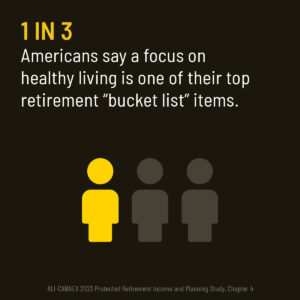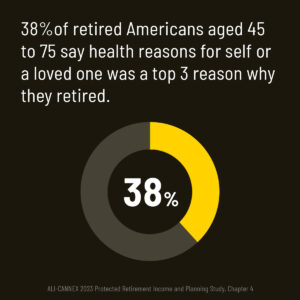Protected Retirement Income and Planning Study – Chapter 4: Growing Health-Related Concerns in Retirement
The Protected Retirement Income and Planning Study (PRIP) is the Alliance’s landmark annual research that explores the changing landscape of retirement and retirement income planning simultaneously among both consumers and financial professionals. The research provides key insights into the rapidly changing retirement income landscape, behavioral shifts and attitudes towards retirement income, and the emerging role of annuities to help protect retirement for millions of Americans.
As our country reaches Peak 65 next year, many Americans are dangerously underestimating the impact healthcare costs and health challenges, like cognitive decline may have on their retirement plans. Peak 65 is a historic demographic phenomenon that occurs in 2024, when more Americans will turn 65 than at any time in history.
Chapter 4 – Growing Health-related Concerns in Retirement – examines the connections between physical, cognitive and financial health as consumers prepare for and live in retirement, and offers recommendations for consumers, advisors, and caregivers to help people secure the financial resources and income needed to cover healthcare costs, long-term care needs and other health-related expenses in retirement.
It is incredibly hard for people to wrap their heads around what could happen to their health 10, 20 or more years into retirement.
-Jean Statler, CEO, Alliance for Lifetime Income.
Key findings include the following:
1 in 3 Americans say a focus on healthy living is one of their top retirement “bucket list” items.

38% of retirees are more concerned about health issues for self or a loved one than they expected to be before retirement.

84% of currently working consumers ages 45 to 75 do not expect health reasons to be in their top 3 reasons for retiring, but 38% of retired Americans aged 45 to 75 say health reasons for self or a loved one was a top 3 reason why they retired.
57% of consumers ages 45 to 75 do not have protected lifetime income through a pension or annuity.
51% of financial professionals report that more clients are asking questions about healthcare, Medicare and long-term care.
From cognitive decline to medical emergencies, we can all benefit from putting our financial decision-making on autopilot as much as possible. One of the best ways to do that is to ensure at least part of our retirement income is protected with an annuity to supplement Social Security. Knowing you’ll always have those two monthly paychecks to cover basic expenses for life can give people tremendous peace of mind when planning for healthcare costs as we age.
– Jean Statler, CEO, Alliance for Lifetime Income
According to the National Council on Aging, a 65-year-old today can expect to live at least another 20 years. Unfortunately, nearly 95% of people 65 or older suffer from at least one chronic condition, like heart disease, diabetes, arthritis and Alzheimer’s.
Most of our brain health is within our control and is largely tied to how we live our lives. We can continue to grow new brain cells at any age. Movement, diet and rest can make a huge difference in reducing the likelihood of developing neurogenerative diseases.
– Dr. Sanjay Gupta, CNN Chief Medical Correspondent & neurosurgeon
To find out more about aging cognitive decline and how financial decision-making is impacted by those challenges by viewing our Alliance Institute Research Paper on the subject and other articles from ALI noted below:
Financial Advisors Look to Protected Income When Addressing Peak 65 Health Challenges
Recent papers by ALI and the Federal Reserve indicate the peak age of financial decision-making occurs at around age 53, and according to a U.S. Senate Special Committee on Aging report, there is a sharp decline in financial literacy among Americans starting around the age of 75.
Yet, many financial professionals do not engage their clients in conversations around cognitive decline, according to the 2023 PRIP study. However, those who do discuss cognitive decline also look to protected income to support the unique challenges of Peak 65ers.
Other key findings from Growing Health-related Concerns in Retirement include:
62% of financial professionals who discuss cognitive decline with clients believe their clients could spend more money if they add an annuity to their retirement plan.

54% of all financial professionals (and 62% of financial professionals who discuss cognitive decline with clients) believe their clients could spend more money if they add an annuity to their retirement plan.
88% of financial professionals who discuss cognitive decline with clients recognize the importance of protected income.
97% of consumers say having guaranteed lifetime income in addition to Social Security in retirement is valuable, but only 43% between ages 45 to 75 have protected income through a pension or annuity.
“Financial professionals should discuss health, including cognitive decline, and the important role that protected income can play to help manage the various health-related risks Peak 65ers could face in retirement,” said Statler
Neurosurgeon, CNN chief medical correspondent and best-selling author Dr. Sanjay Gupta appeared recently on ALI’s Protected Income TV Your Money Map Show with Jean Chatzky, Education Fellow at the Alliance’s Retirement Income Institute, and Founder and CEO of HerMoney.com to discuss ways to protect brain health and keep sharp in aging.
Neurosurgeon, CNN chief medical correspondent and best-selling author Dr. Sanjay Gupta appeared recently on ALI’s Protected Income TV Your Money Map Show with Jean Chatzky, Education Fellow at the Alliance’s Retirement Income Institute, and Founder and CEO of HerMoney.com to discuss ways to protect brain health and keep sharp in aging.
WATCH Your Money Map: Plan to Stay Sharp at Any Age
View full episode:
According to the World Alzheimer Report, almost 80% of the general public are concerned about developing dementia. Evidence also suggests that these fears increase with age. They’re not without merit. Currently, the lifetime risk for Alzheimer’s at age 45 is 1 in 5 for women, 1 in 10 for men. Some 6 million Americans are living with Alzheimer’s disease. One in three seniors will die with Alzheimer’s or some other dementia. Jean Chatzky was joined by CNN’s Chief Medical Correspondent Dr. Sanjay Gupta to discuss this important issue. Dr. Sanjay Gupta is also author of the new handbook, 12 Weeks to a Sharper You. As Dr. Gupta points out – cognitive decline is not necessarily inevitable. Incorporating a series of healthy habits into your day-to-day life can provide protection for your brain – and its health – for the long term.
To view or download findings from the PRIP 2023 Chapter 1, Chapter 2, Chapter 3 & Chapter 4 reports, visit the link below:
To view or download findings from Chapter 4: Growing Health-related Concerns in Retirement:
To view or download findings from PRIP 2023 Chapters 1, 2, and 3:
https://www.protectedincome.org/2024-surge-of-retirement-age-americans-peak-65/